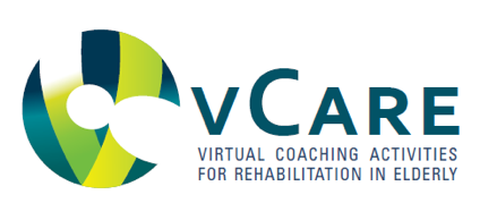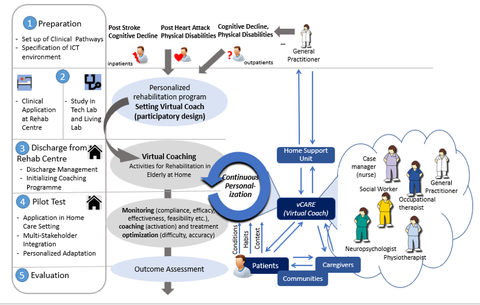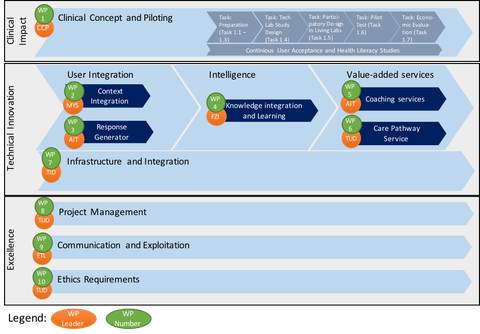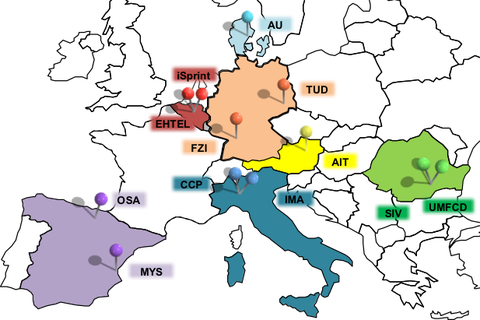Virtual Coaching Activities for Rehabilitation in Elderly (vCare)
Zusammenfassung
Um das Rückfallrisiko einer schweren Akuterkrankung im hohen Lebensalter zu senken, ist häufig eine aktive, durch die Betroffenen motivierte, Umstellung des Lebensstils nötig. In einer internationalen Forschergruppe wird im EU-geförderten Projekt "vCare - Virtual Coaching Activities for Rehabilitation in Elderly" daran geforscht, wie durch eine intelligente Verknüpfung von Gesundheitsinformationen, Daten aus dem Wohnumfeld und aus der regelmäßigen Interaktion mit den Betroffenen ein maßgeschneiderter Übergang von der Rehabilitationsphase in das häusliche Umfeld gestaltet werden kann.
Hintegrund
Im Zentrum des Projektes vCare (Virtual Coaching Activities for Rehabilitation in Elderly) steht der Beitrag zum europäischen Ziel eines gesünderen Lebensstils von Europäern bis 2020. Denn jeder sechste Bürger der EU leidet an einer Behinderung, die üblicherweise durch einen akuten Schub oder eine chronischen Krankheit ausgelöst wird. Zentrale Aufgabe ist es, diesen Menschen eine maßgeschneiderte Rehabilitation bereitzustellen. Dadurch wird es Betroffenen auch im Alter ermöglicht, unabhängig zu leben und so ihre Lebensqualität zu steigern. Allerdings wird die Reha, die meist einige Monate andauert, in ihrer Stetigkeit der Behandlung oft durch den Wechsel vom Krankenhaus ins eigene Heim unterbrochen. Virtuelle Trainer können diesen Patienten dabei helfen, mit einer personalisierten Reha - angepasst an den altersbedingten Zustand des Patienten - fortzufahren. Die Schlüsseltechnologie zur aktiven Patientenbefähigung ist eine Verbesserung der Einhaltung des Pflegeplans und der Risikovorsorge. Das Projekt vCare fokussiert zwei große Mängel des Status quo: der Patient benötigt ein partizipatorisches Design, das sich nach seinen Nutzerbedürfnissen richtet und zudem müssen die Pflegepfade personalisiert werden, was durch die entsprechende Technologie ermöglicht werden soll. Die Reha bietet einen idealen Rahmen zur Verbesserung dieser zwei Probleme, da Nutzer (Patienten und Ärzte) für eine relativ lange Zeit ( 2 Wochen bis 2 Monate) in einer Rehaklinik gemeinsam interagieren: dies ist also eine gute Gelegenheit, um das Krankheitsbild und die Pfade, die das Verhalten des virtuellen Trainers zuhause bestimmen, in den Wissensspeicher des Systems einzubetten. Gut-ausgebaute Dienste der tele-Rehabilitation früherer EU-Projekte, wie z.B. eWall oder Miracolous Life, werden an das neue System entsprechend angepasst. Hierfür wird in das System eine semantische Schicht (universAAL) integriert, welche eine Logikkomponente (Schlussfolgerungsmaschine) enthält, die alle patientenrelevanten Kontextinformationen zusammenführt. Diese erweiterten vCare-Leistungen werden in die Referenzplattform MYSPHERA (FIWARE-based) eingebettet und an vier Referenzorten - die sich mit den üblich betroffenen Bereichen (neurologisch, kardiologisch usw.) auseinandersetzen, implementiert. Die Ergebnisse dieses Projektes sollen das europäische Gesundheitswesen und den IKT-Sektor zu Innovationen im Bereich der integrierten Versorgung von Patienten anregen.
Ziel
Zielsetzung des Projektes vCare ist es, technische, soziale Forschungsaspekte, die den Patienten betreffen, das Gesundheitswesen und die (IT-)Gesundheitsbranchen zu vereinen. Diese fünf Bereiche bilden die Stakeholder des Projektes.
Arbeitsplan
Die Projektlaufzeit beträgt 48 Monate und wird in neun Arbeitspakete (AP) unterteilt. Sechs AP beschäftigen sich mit der Darstellung des Inhaltes in Hinblick auf die technische Implementierung des virtuellen Trainers (Coaches), ein AP mit dem klinischen Konzept und der Steuerung, ein AP mit der Kommunikation und Verbreitung, ein AP mit dem Projektmanagement und ein AP mit den wissenschafts-ethischen Anforderungen.
Beiträge
AP 1: Clinical Concept and Piloting
AP 1 beschäftigt sich mit der Enwicklung des Projektes gemäß eines realen nutzerzentrierten Ansatzes, um die Nutzerakzeptanz und die Lernfähigkeit zu erproben. Dies wird durch die Einbindung eines fachübergreifenden multidiziplinären Projektteams - bestehend aus Neurologen, Kardiologen, Psychologen usw. - erreicht. Zudem soll eine breite Interaktion der Patienten mit dem virtuellen Trainer (Coach) stattfinden, um so Feedback von beiden Seiten über Patientenbedürfnisse, Empfinden und Verhaltensweisen zu erlangen.
AP 2: Context Integration
Das Design, die Entwicklung und die Prototypen-Implementierung der Smart-House-Open-Scalable-Infrastruktur sind wesentliche Punkte des AP 2, welche die Nutzerdienste des virtuellen Trainers (Coaches) unterstützen.
AP 3: Design and Development of Recipient and Caregiver Interfaces
Kernpunkt des AP 3 ist die Entwicklung und das Design der Interaktion zwischen Patient und dessen professionellem Betreuer auf der virtuellen Coachingplattform. Den Nutzern soll eine natürliche und menschliche Kommunikation mit dem virtuellen Trainingssystem durch eine Avatar-basierte Benutzeroberfläche ermöglicht werden.
AP 4: Knowledge Integration and Learning
Die Entwicklung eines soliden Wissensdarstellungs-Frameworks zur Spezifizierung und Realisierung eines semantischen Basismodells und deren verschiedene Ontologien für den virtuellen Trainer (Coach), sind Ziele des AP 4. Die Implementierung eines Smart Agent (Überwachungs- und Logikkomponente), welcher Fälle auf Basis der Architektur verarbeitet und so adäquate Pflegeempfehlungen gibt, ist auch Teil des AP 4.
AP 5: Coaching Services
Die Integration und Anpassung der Trainingsdienste an früher entwickelte Coaching-Dienste der technischen Partner. Die Entwicklung neuer Dienstleistungen für den Endnutzer gemäß dessen eigenen Bedürfnissen steht zudem im Mittelpunkt von AP 5.
AP 6: Pathway System - Semantics driven Pathways Development and Execution Services
Weiterentwicklung des klinischen Pfad-Systems als integrierte klinische Pfade und die semantische Verbesserung der klinischen Pfade. Dadurch soll die Implementierung eines weiterentwickelten Pfad-Systems ermöglicht werden.
AP 7: Service platform backbone
Detailliertes Designen der Systemarchitektur und Interfaces auf konzeptueller (begrifflicher) Ebene. Auf konzeptueller Ebene wird die Infrastruktur mit dem Kernstück Mysphera "E-Health-Platform" vereint. Die semantische Bereicherung der Dienste des Trainers ermöglicht so ein universelles Level der Dienstleistungsbeschreibung und einen leichten Austausch zwischen diesen Diensten.
AP 8: Project Management
Ein professionelles und permanentes Projekt-Management als Notwendigkeit für eine erfolgreiche und effektive Ausführung des Projektes. Der Vorstand wird hierbei durch einen Projekt-Manager des European Project Center of TUD (TUD-EPC) unterstützt. So wird das Projekt auf der operativen Ebene koordiniert und eine hohe Qualität an Forschungsaktivitäten und Entwicklungen zwischen den unterschiedlichen Partnern (mit deren AP) gewährleistet.
AP 9: Communication and Exploitation
Kontinuierlicher Informationstransfer auf europäischer und nationaler Ebene über die Resultate und Entwicklungen des Projektes. Außerdem soll die Hervorbringung von wissenschaftlichen Veröffentlichungen gefördert werden, um so das Interesse bei der wissenschaftlichen Gemeinschaft zu schaffen.
Project ConsorTium
TUD. TU Dresden, Chair of Wirtschaftsinformatik, esp. Systems Development, Dresden, Germany; FZI. Forschungszentrum Informatik am Karlsruher Institut für Technologie, Karlsruhe, Germany; CCP. Casa di Cura Privata del Policlinico Spa, Milan, Italy; IMA. Imaginary SRL, Milan, Italy; AIT. Austrian Institute of Technology GmbH, Vienna, Austria; MYS. TSB Real Time Location Systems SL, Valencia, Spain; OSA. Servicio Vasco de Salud Osakidetza, Vitoria-Gasteiz, Spain; SIV. Siveco Romania SA, Bucarest, Romania; UMFCD. Universitatea de Medicina si Farmacie “Carol DaVila” din Bucuresti, Bucarest, Romania; AU. Aarhus Universitet, Aarhus, Denmark; iSprint. Innovation Sprint, Brussels, Belgium; EHTEL. European Health Telematics Association, Brussels, Belgium.




